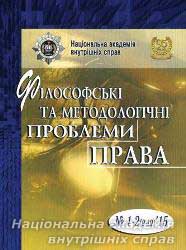Democracy – True or Illusory Freedom?
Keywords:
state, democracy, freedom, people power
Abstract
The article is dedicated to the research of the evolution of the views of philosophers and academicians on democracy, the question of spreading of the democracy around the world. And also the possibilities of the democratic state society to guarantee the rights and freedoms of a human being are analyzed. The article speaks about democracy – the government «in the name of the people, by the people and for the people», the most important value which is freedom – personal, political, national and cultural. The author touches upon the question whether democracy is the driving force for the benefit of the people, or is it just a word, slogan or psychological maneuver that politicians use for personal purposes? At the beginning it deals with the origin of the term «democracy» especially it was begun in Ancient Greece as a way of political life policy. Further comments on the views of various philosophers on this topic. Particular mention Plato which provided first philosophical assessment of democracy. Plato criticized her emphasizing that this system is detrimental to citizens because there are representatives of the people that crime usurp power and become tyrants. It also mentions the thought of Aristotle, who believed democracy is not the right form of government and Montesquieu who said that democracy, giving everyone some bit of power, exposed to constant mixing of private interests with the public good. Then the author passes on to the characteristics of the current state of democracy in Ukraine. He criticized it, pointing out that after the Soviet Union people really can feel free to express their views and participate in various peace demonstrations but this ends their democracy. He quoted the modern Ukrainian philosopher Sergey Datsyuk «Democracy in Ukrainian – is the management of oligarchs, professional politicians and bureaucrats in complete disregard of civil society». To summarize the author stressed that God gave us a unique opportunity – to be a thinking man on the earth and we, people, must understand that are born free, with the right to happiness.Downloads
Download data is not yet available.
Abstract views: 157 PDF Downloads: 3954
Issue
Section
Philosophical problems of particular branches of law studies
Copyright (c) 2017 Philosophical and Methodological Problems of Law

This work is licensed under a Creative Commons Attribution-NonCommercial-NoDerivatives 4.0 International License.
- Authors reserve the right to authorship of their own work and transfer to the magazine the right of the first publication of this work under the terms of the Creative Commons Attribution License, which allows other persons to freely distribute published work with mandatory reference to authors of the original work and the first publication of an article in this magazine.
- Authors have the right to enter into separate additional agreements on non-exclusive dissemination of the work in the form in which it was published in the journal (for example, to post an article in the institution's repository or to publish as part of a monograph), provided that the link to the first publication of the work in this journal is maintained.
- The journal's policy allows and encourages the posting of articles by authors on the Internet (for example, in electronic storehouses of institutions or on personal websites), both before the submission of this manuscript to the editorial office and during its editorial processing, as this contributes to the creation of a productive scientific discussion and positively affects the efficiency and dynamics of citing the published work.




